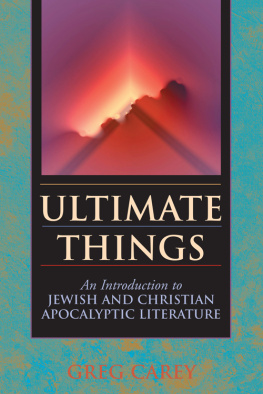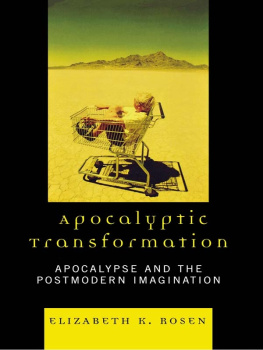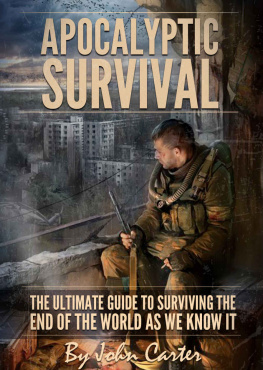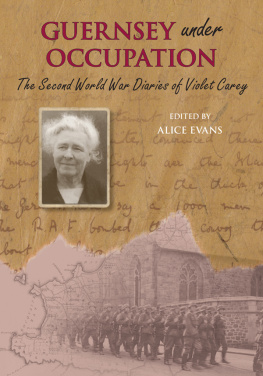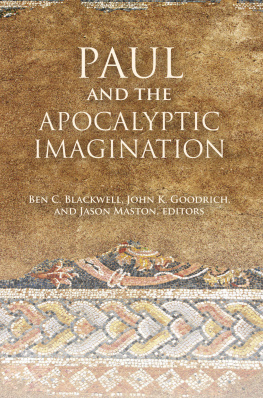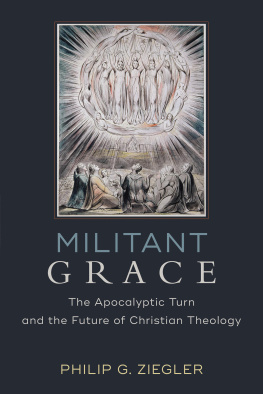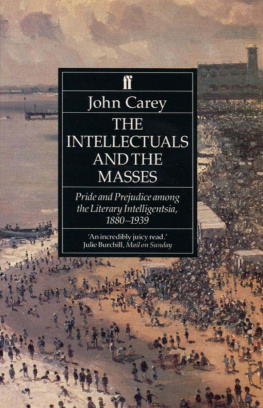ULTIMATE
THINGS
An Introduction to
JEWISH AND CHRISTIAN
APOCALYPTIC LITERATURE
GREG CAREY

Copyright 2005 by Greg Carey
All rights reserved. For permission to reuse content, please contact Copyright Clearance Center, 222 Rosewood Drive, Danvers, MA 01923, (978) 750-8400, www.thenewcopyright.com.
Biblical quotations, unless otherwise noted, are from the New Revised Standard Version Bible, copyright 1989, Division of Christian Education of the National Council of the Churches of Christ in the United States of America. Used by permission. All rights reserved.
Quotations marked OTP are from Charlesworth, James H., ed. The Old Testament Pseudepigrapha: Volume 1: Apocalyptic Literature and Testaments. New York: Doubleday, 1983, or The Old Testament Pseudepigrapha: Volume 2: Expansions of the Old Testament and Legends, Wisdom and Philosophical Literature, Prayers, Psalms and Odes, Fragments of Lost Judeo-Hellenistic Works. New York: Doubleday, 1985.
Cover art: FotoSearch
Cover and interior design: Elizabeth Wright
Visit Chalice Press on the World Wide Web at
www.chalicepress.com
| 10 9 8 7 6 5 4 3 2 1 | 05 06 07 08 09 10 |
Library of Congress CataloginginPublication Data
Carey, Greg, 1965
Ultimate things : an introduction to Jewish and Christian apocalyptic
literature / Greg Carey.
p. cm.
Includes bibliographical references
ISBN-10: 0-827238-03-7
ISBN-13: 978-0-827238-03-9
(pbk. : alk. paper)
1. Apocalyptic literatureHistory and criticism. I. Title.
BS646.C37 2005
220'.046dc22
2005003649
Printed in the United States of America
CONTENTS
As an introduction to apocalyptic discourse in early Judaism and Christianity, this book invites two audiences. It aims to engage students and instructors in intermediate to advanced undergraduate and seminary courses on apocalyptic literature. It also seeks to interest the Bible students who want to delve a bit deeper into an area of scripture where they have interest, perhaps even intense interest, but not much information.
Much of the material presented here, and especially the angles from which I approach particular subjects, have emerged from my own teaching experiences and so should be helpful to the college or seminary student and instructor. I have also imagined a broad audience, people who have read the Bible, perhaps even taken a course in it, but who do not pursue biblical studies as a professional discipline. I hope this book will introduce this audience to the richness of ancient Jewish and Christian apocalyptic discourse: its spiritual imagination, its theological creativity, its literary artistry, and its worldly engagement.
My own students continually find themselves captured by a host of provocative questions that emerge from this literature. Whos to say which questions are central and which are peripheral? Yet after a few years of teaching, Ive learned to expect some questions that routinely interest people. And yes, some of them still snag my own curiosity as well. As a result, Ive set apart some boxed discussions throughout the chapters to address these discrete topics. Some teachers and students may wish to explore these topics in depth, or perhaps some individual readers will do so on their own.
In addition to this general audience, I want to contribute to my field, the academic study of early Jewish and Christian apocalyptic discourse. These chapters do not so much advance a thesis as they promote a way of reading apocalyptic texts. Historical critical scholarship has traditionally taken a somewhat archaeological approach to these texts, digging beneath the surface to uncover the sources of their ideas to reveal the histories of their composition and the nature of their relationships to other literary sources. This book continually relies on the results and proposals such scholarship has generated. All of us seek to understand how, why, and in what context people composed these books.
I am interested in reading these texts somewhat differently, perhaps even with a sort of naive curiosity. As a religious person, as someone who wonders about God and the world, I value these texts as conversation partners. Thus, I want to call attention to their theological and cultural creativity, to the distinctive ways that they interpret their religious traditions and respond to pressing questions. As a reader of literature, I do not want to emphasize these texts as products of redaction or as sources of abstract ideas, which they are, but I want to experience them as literature, to explore their literary and rhetorical design, to engage them as a sort of holy poetry. As a social person, I wish to engage these texts as interventions in the lives of early Jewish and Christian communities, promoting certain ways of being, believing, and acting while opposing others. We might appreciate these religious, literary, and social dimensions of ancient apocalyptic discourse as constructive theology, poetry, and rhetoric. When we hold these categories in mind, we may find ourselves surprised by our own engagement with the creativity, religious passion, and social engagement expressed in these ancient texts. We may even wonder as they stretch our religious and cultural horizons. That has been my experience, and I hope that similar testimonies from students reflect more than brazen flattery.
Im not aware of another book quite like this one in which a single author looks at the broad range of early Jewish and Christian apocalyptic literature, including texts from beyond the body of formal apocalypses. In comparison with volumes in which individual scholars deal with their special fields of research, or anthologies to which teams of scholars make individual contributions, my approach has obvious weaknesses. Yet I believe it has its strengths as well.
In any case, the scope of this project has intimidated me. It isnt possible to discuss every relevant text, though I have attempted to introduce a large and representative selection. As with most surveys, I rely heavily on the hard labor of people who know a lot more about 3 Baruch, for example, than I ever will. In many, many cases, I relied on translations. And yet in every chapter I seek to present fresh interpretations of these ancient texts, from small insights concerning literary devices or rhetorical design to larger arguments concerning their overall function or motivation. Without overloading the pages with scholarly apparatus or jargon, I have sought to acknowledge my many debts and to demonstrate my engagement with the range of contemporary scholarly opinion.
Throughout this volume I rely on publicly accessible translations so that readers may consult the texts for themselves. Unless I indicate otherwise, I make particularly generous use of the New Revised Standard Version Bible, James H. Charlesworths two-volume The Old Testament Pseudepigrapha, Florentino Garca Martnezs The Dead Sea Scrolls Translated: The Qumran Texts in English, and J. K. Elliotts The Apocryphal New Testament. Quotations from other sources or translations of my own are indicated in the text and in notes. In general, I have followed the style format of the Society of Biblical Literature, with one exception. Reflecting my commitment to set aside a books canonical status for the purposes of understanding it in its ancient literary, historical, and religious contexts, I do not marginalize ancient Jewish and Christian non-canonical texts by italicizing their titles.

